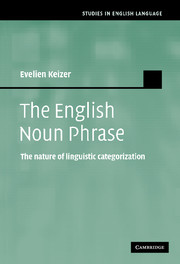Book contents
- Frontmatter
- Contents
- Acknowledgements
- 1 Introduction
- PART I The structural approach: possibilities and limitations
- PART II The cognitive-pragmatic approach: some applications
- 9 The flexibility of language
- 10 Complements and modifiers
- 11 Discontinuous NPs
- 12 Possessive constructions: the author's opinion versus the opinion of the author
- 13 Conclusions
- Bibliography
- Author index
- Subject index
12 - Possessive constructions: the author's opinion versus the opinion of the author
Published online by Cambridge University Press: 25 January 2010
- Frontmatter
- Contents
- Acknowledgements
- 1 Introduction
- PART I The structural approach: possibilities and limitations
- PART II The cognitive-pragmatic approach: some applications
- 9 The flexibility of language
- 10 Complements and modifiers
- 11 Discontinuous NPs
- 12 Possessive constructions: the author's opinion versus the opinion of the author
- 13 Conclusions
- Bibliography
- Author index
- Subject index
Summary
Introduction
Another area where speakers often seem to be presented with a choice between two equally acceptable word-order patterns is that of possessive constructions. To indicate a relationship of (inalienable) possession, as well as a number of other semantic relations (e.g. ‘part-whole’, ‘feature-of’), a speaker can use one of two competing constructions: the prenominal possessive (or genitive: my parents' house; the author's opinion) or a postnominal possessive (the of-possessive: the house of my parents; the opinion of the author). Once again, we will be looking at factors which determine the preference of one construction over the other.
The aim of this chapter is not to give a comprehensive description and analysis of possessive constructions in English. Obviously, apart from the two options mentioned, there are other ways of expressing the semantic relation of possession, such as relative clauses (the house owned by my parents), postnominal genitives (a friend of my parents'; a friend of theirs) and predicative possessive constructions (this book is mine). For an admirable attempt at a unified account of all these constructions, see Taylor (1996). Neither will this chapter provide a detailed description of all the various uses of the English prenominal possessive, or genitive, construction (see e.g. Quirk et al. 1985: 321–2; Huddleston and Pullum 2002: 474). Moreover, the discussion in this chapter will not cover cases of postnominal of-phrases which do not have a genitive counterpart, such as qualifying, appositional, binominal, partitive and pseudo-partitive constructions (which are dealt with in part I of this study).
- Type
- Chapter
- Information
- The English Noun PhraseThe Nature of Linguistic Categorization, pp. 307 - 354Publisher: Cambridge University PressPrint publication year: 2007

